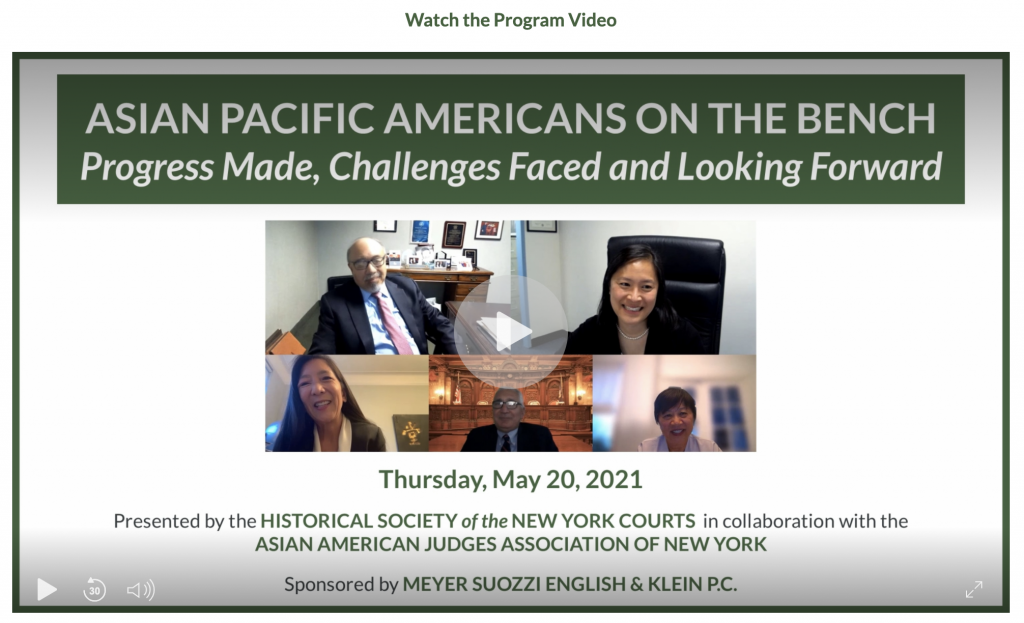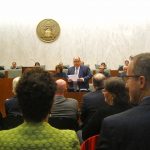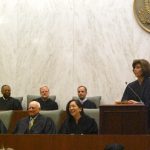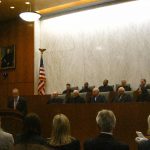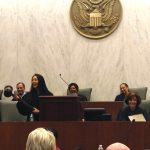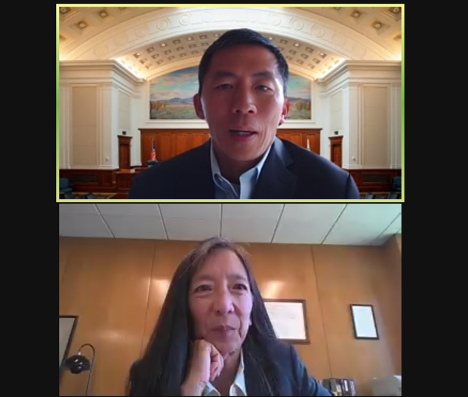
On August 24, the Asian American Bar Association of New York (AABANY), the National Asian Pacific American Bar Association (NAPABA), the Asian American Bar Association of Silicon Valley (APABA-SV) and Cooley LLP co-sponsored “The Rise in Anti-AAPI Violence and a Portrait of Asian Americans in the Law 2.0,” a discussion held on Zoom with Associate Justice Goodwin Liu of the California Supreme Court. The conversation was moderated by United States District Court Judge for the Eastern District of New York Pamela Chen, who made history as the first openly LGBTQ+ Asian American judge to serve in federal court. Both speakers were introduced by Matt Nguyen, a Litigation and Investigations Associate at Cooley LLP and a former law clerk of Justice Liu’s. This discussion was prompted by two trends: The dramatic rise in anti-Asian violence during the COVID-19 pandemic and the lack of AAPI representation in senior leadership roles in the legal profession.
Justice Liu opened the discussion by giving attendees an overview of A Portrait of Asian Americans in the Law (“The Portrait Project”), an analysis of trends related to Asian Americans in the legal profession that was published by Yale Law School and NAPABA in 2017. Notably, the Portrait Project found that there has been a persistent lack of Asian American representation in senior leadership, managerial, and governmental positions, roles with decision-making capabilities, and other prestigious positions in the legal profession, such as clerkships, despite a dramatic increase of Asian Americans pursuing the law in the 1990’s and 2000’s. Respondents in the Portrait Project’s study also reported that they faced many barriers in their professional life, most notably inadequate access to mentors and contacts and a lack of formal leadership training programs. When asked how their colleagues thought of them, respondents said they were frequently perceived as hard-working, responsible, logical, careful, introverted, and awkward, but not as empathetic, creative, or assertive. Justice Liu pointed out that these descriptors could indicate implicit bias towards Asian Americans in the legal profession, as many of them align with stereotypes of Asian Americans as passive, hard-workers who lack social capital. Justice Liu also noted that lawyers and judges should conduct outreach to Asian American students in high school or earlier in college, as AAPIs have the largest declining percentage change in law school enrollment of any ethnic group, and AAPI undergraduates considering an advanced degree are less likely than those of other ethnic groups to think of pursuing a JD.
When asked by audience members why fewer Asian American students are pursuing careers in the law, Justice Liu answered that while the authors of the Portrait Project did not have a definite answer, he believed that negative perceptions about the legal profession during the Great Recession could have dampened interest in the law among AAPI students. In addition, Justice Liu also said that Asian Americans in the law suffer from a continued lack of visibility, as there are few Asian judges, prosecutors, district attorneys, and there have never been any Asian American justices on the United States Supreme Court. According to Justice Liu, increased representation of Asian Americans in government positions, elected office, and in the federal and state judiciaries would bring more attention to issues facing the AAPI community.
AABANY Executive Director Yang Chen also discussed AABANY’s Hate Eradication Active Response Team (HEART), which AABANY launched early in the COVID-19 pandemic to help Asian American community members report potential hate crimes. HEART assists community members who may have difficulty reporting anti-Asian violence due to cultural and linguistic barriers to bring reports to the police or to their local prosecutor’s office. If you would like to learn more about the HEART program or get involved, please follow the link here. Chen also mentioned generally that the AAPI community has come forward to report bias incidents and hate crimes but have not been taken seriously by law enforcement, and the anecdotal evidence for this trend is disconcerting and disappointing.
Justice Liu described this trend as illustrative of the dual challenge faced by Asian American lawyers; while they are responsible for advocating for the AAPI community, they are also victims of anti-AAPI violence and casual racism themselves. He also described such challenges as intersectional, as he discussed how female Asian American lawyers are frequently mistaken for paralegals, defendants, support staff, or almost every other position aside from a lawyer when they are in the courtroom, as the idea of a female Asian American lawyer is seemingly unimaginable. Justice Liu also said that representation is important in ensuring that the public understand the obstacles facing the AAPI community and the severity of the recent increase in hate crimes. In addition, Liu advocated for the increased use of data, as data can illustrate the widespread nature of such violence and can add credibility, while anecdotes can be dismissed as statistically insignificant. Liu also said that it may be wise to recruit those with law enforcement or prosecutorial experience in helping community members make reports, as these individuals would have a strong understanding of reporting procedure and how to work with law enforcement.
When asked about how courts should protect victims of anti-AAPI violence, while also ensuring that courts and the criminal justice system are not contributing to systemic racism targeting Black and Indigenous People of Color (BIPOC), both Justice Liu and Judge Chen said that they did not view these as zero-sum issues. They encouraged Asian, Black, and Brown communities to engage in conversations about these issues, while also saying that anti-Blackness and racism towards Brown and Asian people are all indicative of a larger trend of othering people.
Justice Liu was also asked about ways to reduce partisanship in appointments to higher level positions in government. However, Justice Liu responded by saying that he never believed Asian American representation in judiciaries and district attorneys’ offices to be political, as Asian Americans span the range of the political spectrum in the United States and many Asian community organizations are non-political.
An audience member also asked how Asian American partners and leaders can advocate for themselves and the AAPI community while also ensuring that the law is race-blind and neutral. Justice Liu responded that he viewed advocacy as a way to address implicit bias and negative perceptions that disadvantage people, instead of as a call to give individuals special treatment based on their race. He also called for leaders to re-examine processes and criteria for hiring and promotions, as many of them rely heavily on interviews or other forms of evaluation that could convey implicit biases.
AABANY would like to thank Justice Liu, Judge Chen, and Matt Nguyen for taking the time to lead such a thoughtful, relevant discussion. AABANY would also like to express its gratitude to NAPABA, APABA-SV, and Cooley LLP as co-sponsors for this event, as well as all of the attendees who came to this event. If you are interested in learning more about the Portrait Project 2.0, which is set to be published in 2022, please follow the link here.


